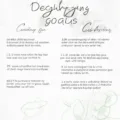The Transformative Power of Decluttering
Decluttering your space is more than just tidying up – it’s a transformative process that can positively impact your mental wellbeing and overall quality of life. When we clear our physical environments of excess and unnecessary items, we often find that we’re also clearing mental clutter, reducing stress, and creating room for more joy and peace in our lives.
This journey of decluttering is not about achieving perfection or adhering to strict minimalist ideals. Rather, it’s about creating a space that nurtures and supports you, allowing you to live more fully and freely. Let’s explore how you can approach decluttering with compassion and mindfulness, focusing on your wellbeing every step of the way.
Starting Your Decluttering Journey with Self-Compassion
As you begin your decluttering journey, it’s crucial to approach the process with self-compassion. Remember, the goal is not to judge yourself for accumulated possessions or to force yourself to part with items that truly bring you joy. Instead, view decluttering as an act of self-care – a gift you’re giving to yourself to create a more peaceful and harmonious living environment.
Start small and be patient with yourself. You didn’t accumulate your belongings overnight, and you don’t need to declutter them all at once. Choose one small area to begin with, such as a drawer or a shelf, and celebrate your progress, no matter how minor it may seem.
The Emotional Aspect of Decluttering
Decluttering can be an emotional process. Many of our possessions carry memories and sentimental value, making it challenging to let them go. It’s perfectly normal to feel a range of emotions as you sort through your belongings – nostalgia, guilt, anxiety, or even grief.
Acknowledge these feelings without judgment. Take time to honor the memories associated with items before deciding whether to keep them or let them go. Remember, letting go of an object doesn’t mean letting go of the memory or the person associated with it. Sometimes, taking a photo of the item or writing down the associated memory can help you feel more comfortable with parting with the physical object.
Creating Space for What Truly Matters
As you declutter, focus on creating space for what truly matters in your life. This process isn’t about getting rid of things for the sake of having less; it’s about making room for more of what brings you joy, peace, and fulfillment.
Ask yourself: What activities and experiences do I want more of in my life? How can I create an environment that supports these desires? Perhaps you want more space for yoga practice, reading, or creative pursuits. By clearing out items that no longer serve you, you’re making room for these enriching activities and experiences.
Mindful Decision-Making in Decluttering
When deciding what to keep and what to let go, practice mindful decision-making. Instead of following strict rules about what you should or shouldn’t keep, tune into how each item makes you feel. Does it bring you joy? Does it serve a practical purpose in your current life? Does it align with your values and the person you’re becoming?
Be honest with yourself, but also be kind. It’s okay to keep items that truly make you happy, even if they don’t serve a practical purpose. The key is to be intentional about what you choose to keep in your space.
Sustainable Decluttering: Responsible Disposal and Donation
As you declutter, consider how you can dispose of items responsibly. Donating usable items to local charities or gifting them to friends and family can be a wonderful way to extend the life of your possessions and potentially help others in need.
For items that can’t be donated, research recycling options in your area. Many items, from electronics to textiles, can be recycled rather than sent to landfills. This mindful approach to decluttering aligns with principles of sustainability and can help you feel good about the process of letting go.
Maintaining a Clutter-Free Space
Once you’ve decluttered your space, the next challenge is maintaining it. Remember, this isn’t about achieving perfection, but about creating habits that support a more organized and peaceful environment.
Implement simple routines, like spending a few minutes each day tidying up, or adopting a “one in, one out” rule for new purchases. Be gentle with yourself if clutter starts to accumulate again – it’s a natural part of life. The skills and mindset you’ve developed through your decluttering journey will help you address it with greater ease and compassion.
FAQ: Decluttering Your Space
1. How do I start decluttering if I feel overwhelmed?
Start small. Choose one drawer or one corner of a room. Set a timer for 15 minutes and see what you can accomplish. Remember, any progress is good progress.
2. What if I regret getting rid of something?
It’s natural to have some doubts. However, most people find they rarely miss the items they’ve decluttered. If you’re unsure about an item, consider putting it in a “maybe” box for a few months. If you don’t use or think about it during that time, it’s probably safe to let it go.
3. How can I declutter sentimental items?
Take it slow and be gentle with yourself. Consider keeping a few representative items and letting go of the rest. Taking photos of sentimental items can help preserve the memory without keeping the physical object.
4. How often should I declutter?
There’s no set rule. Some people prefer to do a big declutter once or twice a year, while others like to maintain their space with small, regular decluttering sessions. Find what works best for you and your lifestyle.
5. How can I prevent clutter from accumulating again?
Be mindful of what you bring into your home. Before making a purchase, ask yourself if the item truly adds value to your life. Implement simple organizational systems and try to put things away immediately after use.
Remember, decluttering is a journey, not a destination. Be patient and kind to yourself as you create a space that truly supports and nurtures you. The process of decluttering can be a powerful act of self-care, leading to a more peaceful, joyful, and intentional life.









